
You are reading:

You are reading:
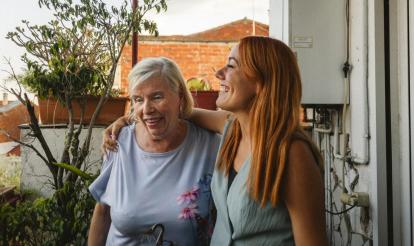
30.09.25
12 minutes readTeresa, Javier, Blanca and José are four individuals between the ages of 70 and 80 who have struggled with feelings of loneliness. Their participation in the ”la Caixa” Foundation’s Always Supported programme has helped them find wellbeing in their situation. Their stories can be heard in a telephone booth installed in Granada (or through the online experience). This initiative aims to raise awareness of the phenomenon of loneliness to mark the International Day of Older Persons.
“Loneliness squeezes, squeezes, and squeezes even more. Then you say: ‘Dear God, either I die or I get out of this.’ Because you have no desire for anything. Not to talk, not to pick up the phone, not to go out… You’re so consumed by the fact that you’re alone… ‘Oh, how lonely I am! And what am I going to do, so alone?’ And you don’t think about anything. Loneliness is something dreadful.”
That is how Teresa Mazón Sans felt some time ago. She was a teacher, ran a travel agency with her husband and cared for him and their three children. She is now 80 years old. For her, loneliness means that “you feel empty inside and helpless all around you.”
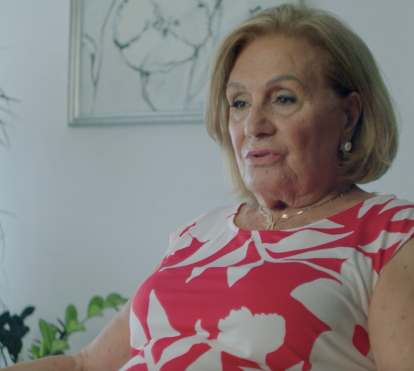
Like many other parents, Teresa faced the “empty nest” when her children left home, although she soon adapted and enjoyed living alone with her husband: “It was like rediscovering each other, as if we’d just met. It didn’t last long, but while it did, we made the most of it.”
It lasted until, eight years ago, he passed away unexpectedly. “When someone you love very much dies, it’s like a wave that completely drowns you. I was looking for something to hold on to, so I wouldn’t drown, but I couldn’t find it. Every day the wave, every day the wave,” Teresa recalls. But even such a painful ordeal can be overcome: “There came a moment when that wave didn’t come so often. At least it let me breathe a little. And then it went away. I had a terrible time, but grief is something you have to go through.”
For her, housing played an important role in her feeling of loneliness and in how she coped with it. “I had a huge home, and there came a point when I felt overwhelmed, like the flat was falling in on me. It was the first time in my life that I found myself alone,” she says. “I started saying ‘I’m alone.’ I spoke less and less, I didn’t even speak to myself,” she recalls. She describes a kind of loneliness that “wraps itself around you: you’re in a hole and it keeps dragging you down, you’re inside and it feels as though you’re going further and further down.”
Until, at a certain point, her children suggested she move house. The idea excited her, but it wasn’t easy either. When she arrived at the new flat she saw that “there was nothing there.” “The first night I went to bed I said to myself: ‘Now you’re here with four walls, and what? What else is there? I have to find something. I have to prove to myself that I can live here!’” Teresa recounts.
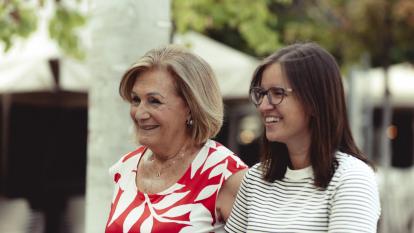
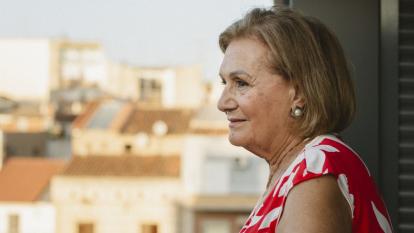
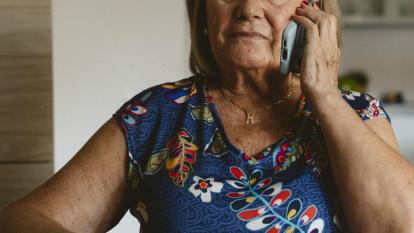
She managed to prove it to herself with two plants: one she bought and the other she already had. To the new one she said, “If you grow in this flat, I’ll grow too.” And to the “older one”, which she identified with herself, “If you start to sprout, lazy as you are, then the two of us will live here. If not, no-one will live here.” She watered the plants with hope, and they did just what she asked: “The new plant produced some little flowers and lived. The other one perked up as well. And I said: ‘If everything else is living here, I’ll live too.’ And so I lived.” For Teresa, the key lies in hope: “You just need to have something to look forward to. That’s what keeps you going. Today I’ll make myself eggs with tuna, today I feel like buying a pair of shoes… Finding joy in simple things.”
To learn how to cope with her loneliness, Teresa has received support from the Always Supported programme of the ”la Caixa” Foundation. This initiative seeks to empower older people experiencing loneliness and accompany them in their search for a fulfilling life by fostering relationships based on wellbeing and support. The aim is not for people to stop being alone, but rather to help them feel well even if they are. In 2025 it has already supported more than 3,300 older people in Spain and Portugal.
Teresa was referred to the service by her psychologist. Through regular contact, the Always Supported caseworker guided her towards achieving her goals: “See that notebook over there? That’s where Ana wrote down everything I needed to do. She helped me so much. She’d say, ‘Well, María Teresa, what have you done today in the new flat?’ Maybe I had to buy some pictures. She wrote in the notebook: this week we’ll buy the pictures.” The programme has helped her to improve her wellbeing: “They taught me to live the way I want.”
Another participant in the ”la Caixa” Foundation’s programme is Javier Guiu Farrè. He is 70 years old, 40 of which he spent working in the financial sector. Beyond his professional career, he enjoys researching and digitising old documents from the 18th and 19th centuries: “My passion is building family trees, especially for my own family. I go through documents in different church archives or wherever I can to trace the oldest generation possible. I’ve gone back as far as 1640.” “I’m not someone who sits still; I’m someone who needs to be active,” he says of himself.
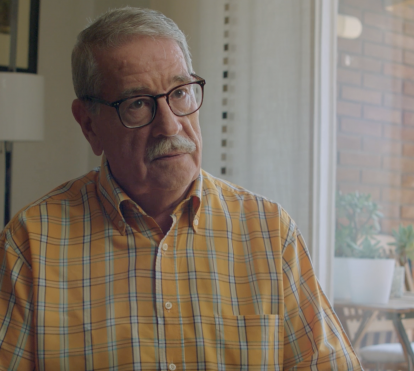
His life changed in 2022, when he was widowed: “My wife, my mother-in-law and I all caught Covid. My mother-in-law was 97 at the time. She and I survived, I don’t know why, but after 10 days in hospital, my wife died.” That was when his feeling of loneliness began. “When you walk into the house you don’t even say good afternoon, because the walls don’t answer back. If you leave a piece of paper on the table, you find it still on the table. I never expected to be in this situation,” he laments.
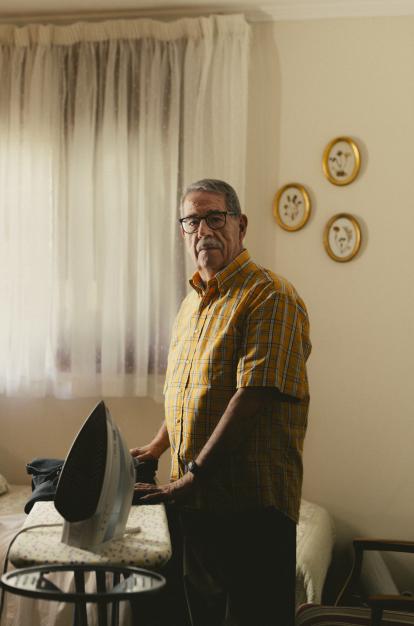
For Javier, “the hardest part is that you can’t share with anyone what you really do from day to day. The days are very long. Winter, the afternoons… You watch a lot of television, you end up with a headache, and then the only thing you do is think. Think and think. Why did this happen to me? Why did others survive and my wife didn’t?”
One of the things that helps him feel less alone is a WhatsApp group: “We’re a group of friends who say good morning and good night to each other. It’s not about the words themselves, but about knowing that someone is thinking of me and I’m thinking of them. It also means that if someone doesn’t reply within 24 hours, we wonder if something has happened to them.” He also has “closer friends” who go a step further: “They come round, get me out of the house, and we go for a coffee or a soft drink…”
He recalls that he got through the rough patch partly thanks to the support of those close friends and also by turning to the Always Supported programme. The group sessions there have helped him: “Listening to what others said, you’d think, ‘Wow, what worked for this person might also work for me. There are people going through the same as I am.’” Javier says that in the group he has learnt to “live with loneliness with dignity.”
He also reflects that we often “find it hard to admit that we’re lonely” and to “ask for help”. “Sometimes you need someone to tell you: ‘Look, go to a professional who can help you get through this rough patch.’” So he encourages others who are experiencing loneliness to “ask for help as soon as possible”. “Don’t wait too long, like I did. You can’t get through things on your own,” he warns.
Blanca Polanco Borràs is 71 years old. She worked for a decade at a bar association, which she remembers as “a very lovely experience”. “I met people who had nothing and people who had a lot,” she says. She left when she became a mother.
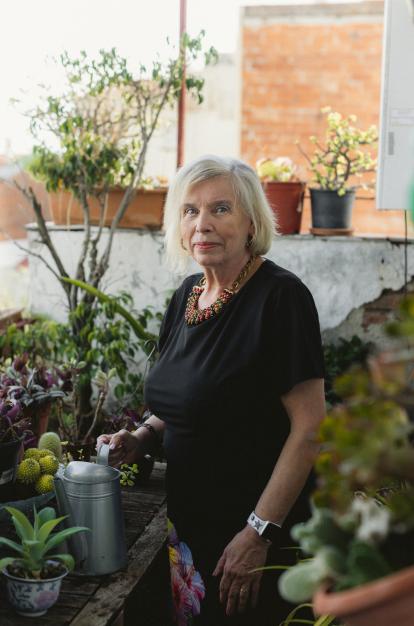
After that, she devoted herself to raising her children. Her sense of loneliness came later, after separating from their father and as her children grew up and built lives of their own. “That’s when I found myself very alone. I’ve always liked having someone by my side to help me and for me to help them. And I found myself alone, with an empty nest,” she recalls. “My children are very good, and I know that if something happens to me, I just have to call and they’ll come. But I have to make that move, and what I’d really like is for them to be the ones to say, ‘Mum, how are you?’ When they call me, it’s usually because something’s happened or they need something. And that hurts,” Blanca confides.
For a while, she did not even want to leave the house: “Why should I go out? What was there to do? I’d already done everything.” Now, the opposite is true: “I want to do more and more and more.”
Another moment that triggered Blanca’s sense of loneliness was the death of her mother, who played a very important role in her life. “She was my rock. Just by looking at me she knew what I was thinking, what I needed… When I had problems, I’d go to her,” she recalls. Her mother died unexpectedly. “Losing my mother, who was my anchor, made me feel alone, very alone,” she explains.
For Blanca, loneliness is “having an emptiness inside”. “Things that happen to you and feelings you have, you can’t share them with anyone, you have to keep them to yourself,” she says, “and in the end it builds up like a blockage that has to come out somewhere.”
She has managed to overcome that blockage with the help of Always Supported and is very grateful to Maica, the programme’s caseworker who supports her. “I was lucky with Maica. I didn’t want to go, and she kept saying, ‘Come on, come on, you’ll see.’ I went, and for me it was the last step I needed to take to be well. She’s helped me enormously and she understands me,” says Blanca.
José Perucho Miralles has led a solitary life. “I’m single and I’ve always been on my own,” he reflects at the age of 77. He was born in Agramunt, a village in Lleida, and at 17 or 18 he moved to Barcelona to live with his uncle. There, he did all sorts of jobs: delivery man, debt collector, salesman, warehouse worker… until he became a taxi driver, a job he stuck with for more than 15 years.
“The job of a taxi driver is quite peculiar,” says José, reflecting on the social side of his work. “Sometimes you get a customer who wants to talk a lot and you have to indulge them, and then there are others who say absolutely nothing apart from the address until they reach their destination,” he explains. Outside of work, he found himself quite alone: “I had friends, of course, but they were bar friends, people you only talk to about trivial things, nothing to do with real friendship or companionship.”
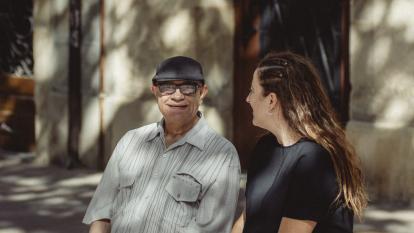
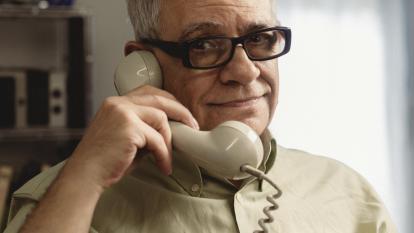
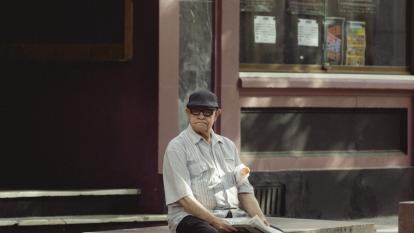
After giving up taxi driving on medical advice, due to the stress it was causing him, he returned to Agramunt in his late forties to care for his parents. He looked after them for several years. When they passed away, first his father, then his mother, his loneliness deepened: “When I was left on my own, my world collapsed. I even suffered from depression because of it.”
“For me, loneliness is a deep sadness. I wouldn’t wish it on anyone,” reflects José. “You’re at home, you have the usual routines of someone living alone, but you miss something, the company of another person, whoever it might be. And since it doesn’t happen, you just have to put up with it, and that wears you down a bit,” he shares.
Now, however, his situation has improved because he has made some friends. For a while, he spent his weeks going with one of them every day to markets in nearby towns: “Mondays to Tàrrega, Wednesdays to Mollerussa, Saturdays to Balaguer… We’d go to a market and it kept us both occupied.” That friend later fell ill and is now in a care home. With another, he meets up from time to time: “On Wednesday I called him and we went for an aperitif at the village chocolate shop. He talked mostly about the things he likes, and I a little about mine, because sometimes he doesn’t let me get a word in. But the most important thing is that we keep each other company.”
Taking part in Always Supported has been key to improving his wellbeing. He called after seeing an advert at the community centre he attended. “I signed up, and since then my life has changed quite a lot,” says José. For him, it has been a “fabulous” experience that has led him to “talk to lots of people”. He believes the programme lives up to its name: “That’s it, always supported, that’s the word.” For him, it has meant going “from being alone, bored, sad and a little depressed, with no desire to do anything, to being cheerful, content and with some desire to live better.”
Loneliness is a reality that affects three million older people in Spain, but, as these four stories show, with the right support, it can be eased.